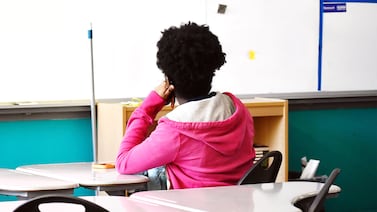Sign up for Chalkbeat Colorado’s free daily newsletter to get the latest reporting from us, plus curated news from other Colorado outlets, delivered to your inbox.
The Adams 14 school district in Commerce City faces some of the most serious environmental hazards of any in Colorado. It’s also one of the lowest performing.
But external factors such as local levels of poverty or pollution aren’t a part of Colorado’s school rating system that holds districts accountable for student test scores. Adams 14 officials have asked the State Board of Education to reconsider that. But it looks like they have an uphill battle.
After more than a year of work, a 26-member task force has almost finished a set of recommendations for changing the state’s accountability system. The group’s latest draft, published on Friday, doesn’t recommend considering factors such as the environmental pollution in a community, although it’s still taking feedback.
At a State Board of Education meeting last Wednesday, Adams 14 Superintendent Karla Loria highlighted pollution in Commerce City, and research showing that such conditions can contribute to higher rates of student illnesses, learning disabilities, and behavioral problems.
Community members say their higher than average rate of adverse health issues are directly tied to conditions created by industries like a Commerce City oil refinery run by Suncor Energy that has faced multiple investigations for exceeding the amount of pollution it is allowed to release into the air. Commerce City, a heavily industrialized community north of Denver, is considered a disproportionately impacted community, based on state data.
“Adams 14 students face, every day and night, detrimental environmental exposures that more than 90 percent of our students across the state do not face,” Loria said.
The Adams 14 school district currently serves about 5,400 students, of which more than half speak English as a new language and a majority come from low-income families. Those demographics, when combined with high pollution levels, create a challenging situation for Adams 14 students and educators, Loria said.
Wendy Birhanzel, the superintendent of the Harrison school district and the chair of the task force looking at the accountability system, said she’s well aware of how external forces impact students.
But she said the task force focused on inequities within the accountability system, and stuck to factors that are within a school district’s control. In the year the task force has been meeting, she said she didn’t hear concerns about environmental pollution.
“We know there’s a lot of factors that go into a student’s performance or a student’s success, and so with our charge it was really about what can schools and districts control and change within their own systems to change outputs,” Birhanzel said. “When you talk about those outside factors, that becomes a whole different conversation than really what our focus was.”
Accountability system’s handling of Adams 14 spurred criticism
For its accountability system, Colorado mostly looks at student performance on standardized state tests, and student growth on those tests. At the high school level, the rating system also considers graduation rates and how many students move on to postsecondary options.
Districts can earn one of five ratings. In the most recent results for the last school year, just 11 districts — including Adams 14 — received one of the lowest two ratings. Being in those two lowest ratings for five years or more then means the state must step in and order an improvement plan, or take steps like closing schools.
Adams 14 was the first district to reach so many years on the watchlist for low ratings. The fallout has put a strain on the accountability system, as well as the local community. The State Board stripped the district’s accreditation in 2022, and ordered a reorganization that could have resulted in school closures or even the dissolution of the district. But after community pushback, the state backed off the order.
Many community members pointed to factors outside of the school’s control — including poverty, bad water, and student health issues — as reasons why they said the state’s ratings system was unfair, punitive, or inaccurately capturing student learning.
For years, Adams 14 has been working with outside consultants trying to improve student achievement. But it has yet to show improvement on the state’s rating system.
A majority of schools and districts initially identified for low performance under the same system do manage to improve and get off the watchlist.
Still, Colorado lawmakers commissioned an audit to examine the state’s accountability system. In 2022, the audit concluded that the system was reasonable, although it did find that certain groups of students, such as Hispanic students, were more likely to struggle.
After that audit, the state convened a task force to determine whether there should be changes to the state’s accountability system.
That task force has been meeting since August of last year. Their latest draft includes more than 20 possible recommendations including creating a super subgroup to avoid over-counting students who fall into more than one subgroup, and translating more of the state tests into more languages.
Birhanzel said the recommendations will help the state “better measure where we’re succeeding and where we need to support schools, districts or students.”
The final report is due by mid-November. Some of the recommendations could be adopted by the State Board or the Colorado Department of Education, but some could require changes to the state law on accountability.
Adams 14 seeks help from new Colorado rules
This month, much of Commerce City is breathing a sigh of relief after an oil and gas company dropped plans to expand gas storage tanks across the street from an Adams 14 elementary school. But that reprieve for the district doesn’t address all its current concerns about environmental dangers.
Adams 14 officials implied in their public comments last week that due to new state rules about environmental justice, the State Board had a legal obligation to consider the district’s official status as a disproportionately impacted community when making any changes to the accountability system.
The new rules define a “disproportionately impacted community” and suggest that more state agencies factor the designation into their decisions. The Colorado Department of Education was not listed among the state agencies, although the rules note that its list of such agencies isn’t meant to be exhaustive.
The state education department disputed Adams 14′s interpretation of the rules, saying it’s not aware of such a requirement. But it did say it would review relevant materials from the district about that issue.
“We recognize that factors outside schools’ control impact the student learning environment,” the department said in a statement. “Our department and the state board can and do consider those factors when making decisions about how to support districts and schools.”
Yesenia Robles is a reporter for Chalkbeat Colorado covering K-12 school districts and multilingual education. Contact Yesenia at yrobles@chalkbeat.org.






